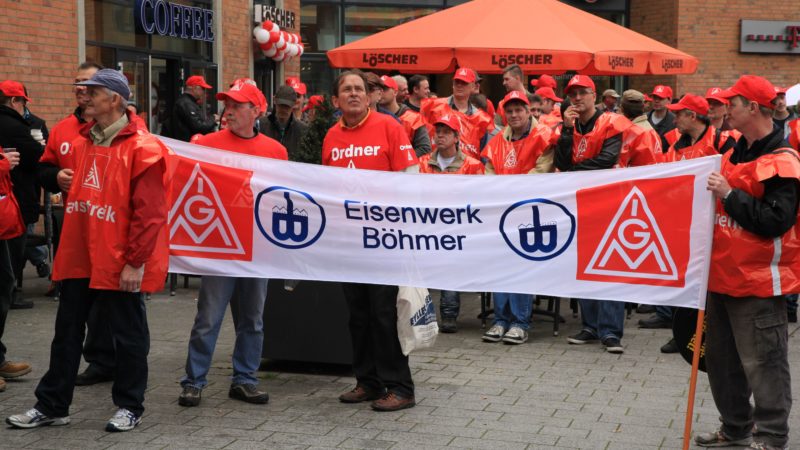What can we learn from Europe's largest union, which is pushing for members to work less for the same pay?

“If by the end of January the employers have not changed their stance, we will consider resorting to 24-hour strikes or calling a vote for a general strike.”
IG Metall’s strength is boosted by full order books and low unemployment. The Gesamtmetall (the engineering employers’ federation) has so far offered 2% and rejected any movement on hours.
This has angered the union who are pushing for a radical reduction on hours of work having consulted with union reps and members widely.
Employers will be wary as IG Metall led the campaign – and won – a 35 hour week in the 1990s. IG Metall’s claim is for workers to be allowed to switch to a 28-hour week for a two-year period to look after children, family and undertake community work — but with limited impact on wages.
“The time has come for workers to demand more self-determination to adapt working hours to their personal situation,” Hofmann said last year. He said the trend for more flexible working hours in recent years had mainly benefitted bosses who got staff to work longer shifts.
The union claim has created debate in Germany on work life balance. The union accepts that in certain circumstances, reduced working hours must not go hand-in-hand with a drastic salary cut — for instance when staff are caring for young children or ailing relatives.
In those cases, the union wants employers to top up workers’ salaries to help make up for the shortfall that comes with clocking up fewer hours. It also wants employees to be guaranteed a return to a 35-hour week after two years.
Professor Gustav Horn of the respected think tank Hans-Boeckler Foundation said: “I think IG Metall’s proposal is very modern.” He said it would lead to higher costs that would hurt employer’s bottom line, but could also be a way for firms to hold onto their best workers. “In future, well-qualified employees will select those companies that offer flexible hours that suit their lives at that time,” he predicted.
But Holger Schmieding, chief economist at Berenberg bank, said a shorter week would mainly hurt many companies including those in the Mittlestand (SMEs in the supply chain)
The Gesamtmetall employers’ federation has slammed IG Metall’s demand as “too costly” and “unfair”.
But IG Metall says firms were losing out on retaining skilled workers by not meeting their needs, particularly among the female workforce.
The controversy is also an issue that will surface with Chancellor Angela Merkel who is ready to open talks to form a grand coalition government with the SDP next week.
The Social Democrats lead by chief negotiator Andrea Nahles, has already said it was “a good thing” that IG Metall was putting working time at the heart of its demands.




2 Responses to “German unions are showing how to win a 28-hour week”
Alasdair Macdonald
In Germany the legal rights position of trade unions is pretty strong within the constitution of the Federal Republic and that same constitution devolves significant powers to Laender and to communities within the Laender. Germany has also sustained a significant manufacturing base compared to the ridiculous skewing towards services, substantially based in the South East with few real powers devolved anywhere else.
Labour 1997/2010 wilfully failed to give trade unions powers to enable them to defend their members against the increased powers accruing to business, particularly financial services, due to the class Quisling Gordon Brown’s ‘light touch regulation’.
Labour failed to redistribute substantial powers to the nations and to the regions of England. In Scotland, the powers were severely circumscribed, even after, Mr Brown’s mendacious ‘Vow’, so that the Scottish Governments room for manoeuvre were severely curtailed and to open any Scottish Government to media and opposition attack if they tried to make significant change. At least in Scotland, and to some extent in Wales, some powers have been devolved. All attempts, and they were pretty perfunctory ones, at regional devolution in England came to naught.
Reorganisation of the House of Lords was very minor, especially, as it provides an agreeable billet for so many Labour politicians given the heave by the electorate.
Labour has some ‘blancmange’ policy on ‘federalism’, but, essentially, it wants to retain as much as possible at Westminster and even claw some back from Scotland and Wales. It could not really give a monkey’s about Northern Ireland, since it has never campaigned there and Mr Roy Mason was possibly the most vicious Secretary of State regarding the actions of the British armed forces and security services towards the Catholic community.
I agree with the sentiment of the article regarding the German Trade Unions and would like to see things like that in the UK (assuming it continues to exist), but I do not think Labour is capable of making such ambitious change. It simply wants to be in charge and to be able to use the levers of power for a short while, perhaps, producing a short lived rise in wages and living standards of many people, but such changes will not be made constitutionally irreversible and will be rapidly dismantled when the forces of reaction get back in control after regrouping during the five year hiatus when Labour stumbles from pillar to post as the international financiers wage economic war and the historic ‘run on the pound’.
Jimmy Glesga
Have to laugh at Macdonald, Roy Mason took on the PIRA who were hidden by the Catholic community that did not give a toss about the Irish non Catholic community. The PIRA are an organisation infested by Catholic bum boy child molesting priests who want an all Catholic all Gaelic speaking Ireland.. There never has been any connection with PIRA and socialism.